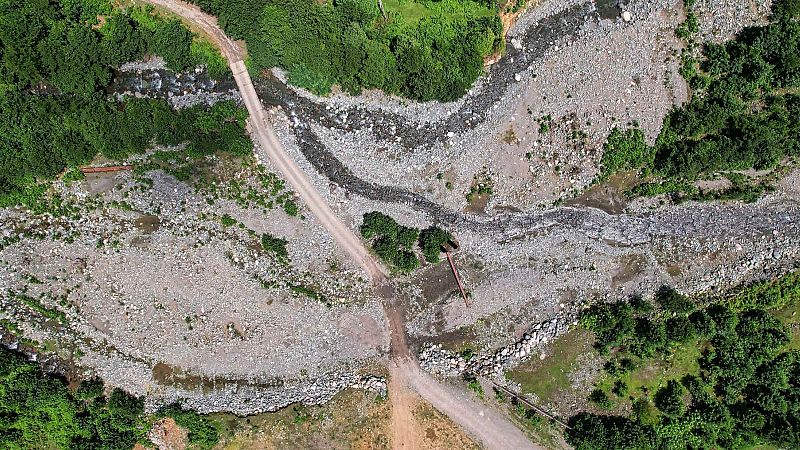
As extreme weather becomes more frequent, researchers are turning to artificial intelligence in an effort to better understand and respond to climate-fuelled disasters.
After a 7.4-magnitude earthquake struck just outside Hualien in Taiwan in April 2024 - the strongest in the country in 25 years - thousands of landslides devastated remote mountain communities. To assess damage, emergency teams often rely on satellite images to spot affected areas. But manually scanning these images can take hours or even days.
Geoscientists at the University of Cambridge think they have a tool to change that. They are training AI to detect landslides and help rescue teams act faster.
“In the aftermath of a disaster, time really matters,” Lorenzo Nava, a research associate in the university’s departments of earth sciences and geography, said in a statement.
A faster way to see what’s happening on the ground
The team is working to build AI models that can automatically identify landslides in satellite images, even when cloud cover or darkness makes it hard to see them.
The effort is part of CoMHaz, a Cambridge research group focused on cascading and multi-hazard disasters, where one event triggers another or multiple events occur at once.
By combining standard optical imagery with radar data, which can penetrate clouds and work at night, the researchers hope to make their detection models faster and more reliable in crisis situations.
Following the Hualien quake, their system flagged over 7,000 landslides within just three hours of receiving satellite imagery, according to a recent study they published in Natural Hazards and Earth System Sciences. The same process would have taken far longer if done manually.
The team hopes this technology will help first responders prioritise areas in urgent need of assistance, especially in remote or mountainous regions where timing is critical. Eventually, they believe it could predict landslides before they happen.
Why AI matters as climate disasters worsen
Europe has faced wave after wave of climate-driven disasters in the past year.
In Switzerland, a glacier collapse in May triggered a deadly landslide that engulfed a small alpine village. Before that, flash floods in Valencia killed several people after record-breaking rainfall overwhelmed the city’s infrastructure. And across Southern Europe, heatwaves, fires and floods are hitting with increasing intensity.
Scientists say climate change is not only fuelling the severity of these events - it is also exposing weaknesses in disaster response systems. Landslides, for example, are being worsened by heavy rainfall, deforestation and rising temperatures that make slopes more unstable.
AI may not be a cure-all, but it could offer much-needed support. Tools like the ones developed by the Cambridge team are designed to prioritise resources, identify hard-hit areas faster and, in some cases, support early warnings.
Now, Nava and Maximillian Van Wyk de Vries, a professor of natural hazards at Cambridge and head of the CoMHaz group, are working with local scientists in Nepal to pilot an AI-supported early warning system in Butwal, a town vulnerable to landslides.
Developing AI that decision-makers can trust
Speed isn’t the only goal. The researchers are also designing their models to show why they detect certain features. They hope that will help disaster response teams and local decision-makers trust the AI recommendations they receive. And perhaps help local communities have better response plans for worst-case scenarios.
To improve their system, the Cambridge team has joined forces with the European Space Agency, the World Meteorological Organisation and other partners.
They also launched a data science challenge to refine their AI model and make its results more transparent. After earthquakes or major storms, the researchers say, better information can save lives.
“It’s important to make it easier for end users to evaluate the quality of AI-generated information before incorporating it into important decisions,” said Nava. “In high-stakes scenarios like disaster response, trust in AI-generated results is crucial.”







